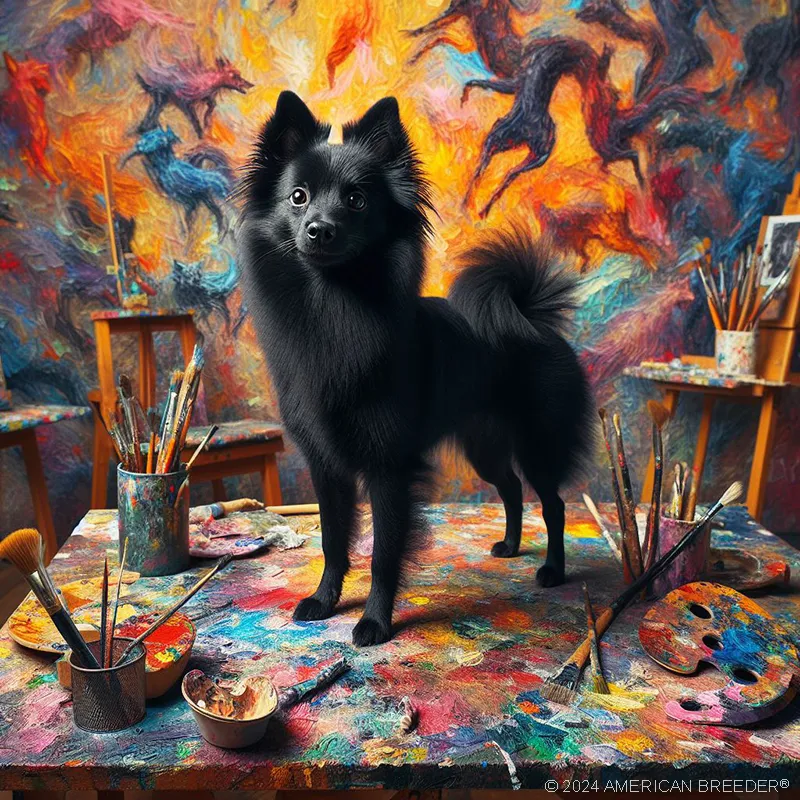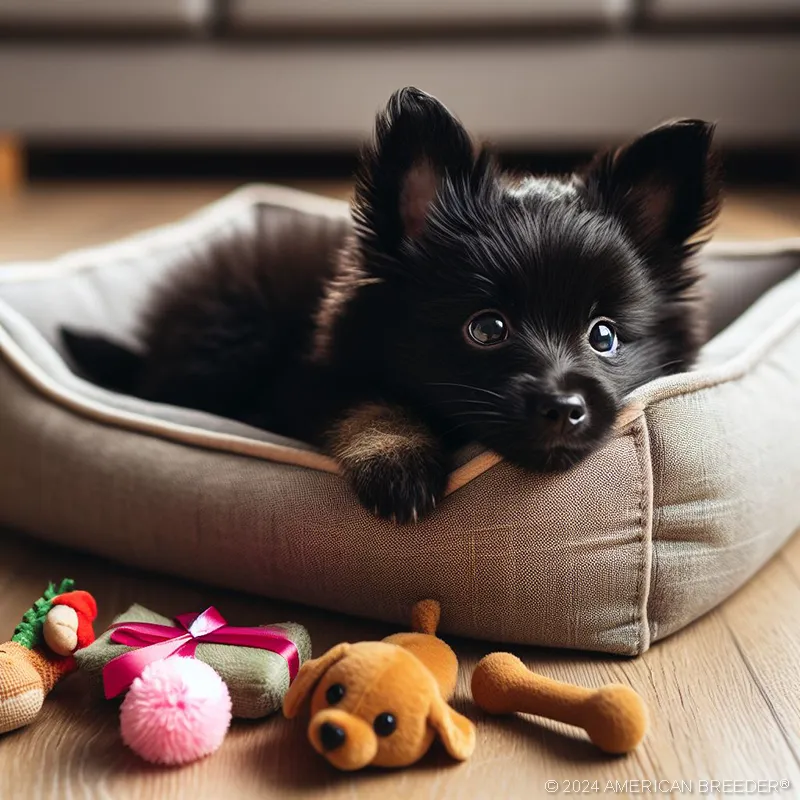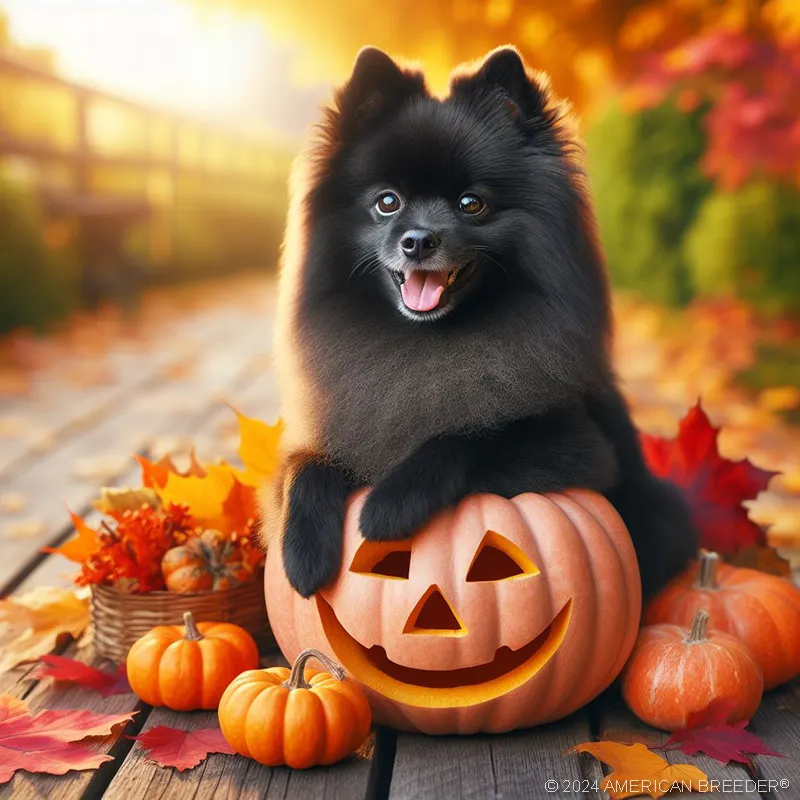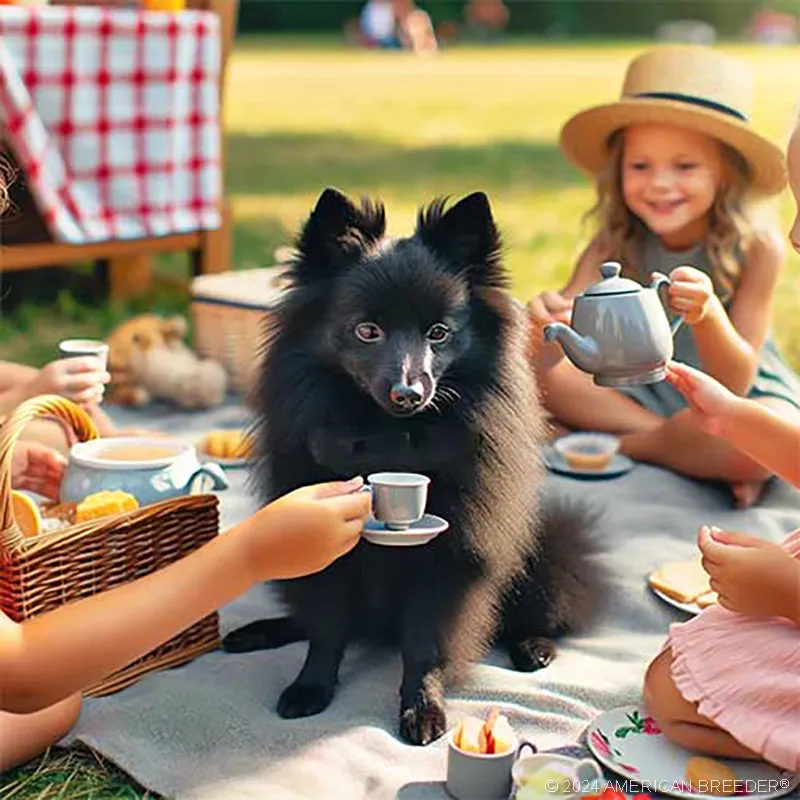Schipperke Dogs: The Little Black Fox with a Big Heart
Introduction and Breed Background
 Welcome to the fascinating world of the Schipperke Dog, a small but mighty breed with a rich history and a captivating personality. The Schipperke, affectionately called the "Little Captain," is a spitz-type dog that hails from 17th-century Belgium. Originally bred to be canal barge guards and vermin hunters, they quickly won the hearts of those around them and evolved into beloved companions. If you're considering bringing a Schipperke into your life, there are some essential considerations to keep in mind. In this comprehensive guide, we will delve into the breed's unique traits, history, temperament, and everything you need to know to provide a loving and fulfilling home for this incredible canine companion.
Welcome to the fascinating world of the Schipperke Dog, a small but mighty breed with a rich history and a captivating personality. The Schipperke, affectionately called the "Little Captain," is a spitz-type dog that hails from 17th-century Belgium. Originally bred to be canal barge guards and vermin hunters, they quickly won the hearts of those around them and evolved into beloved companions. If you're considering bringing a Schipperke into your life, there are some essential considerations to keep in mind. In this comprehensive guide, we will delve into the breed's unique traits, history, temperament, and everything you need to know to provide a loving and fulfilling home for this incredible canine companion.
Before diving into the details, let's explore some interesting facts and fun tidbits about the Schipperke. Aside from their official name, you may come across other monikers for this spirited breed. In some regions, they are known as "Spitske" or "Little Black Fox," a nod to their fox-like face and dense, black coat. This intelligent and lively breed has earned its place as a cherished member of many families, and their playful antics and unwavering loyalty have earned them the nickname "Velcro dogs" for their attachment to their owners.
Breed Background and History
The origins of the Schipperke Dog trace back to the Flemish region of Belgium, where they were bred by canal boatmen to serve as rat catchers and vigilant guardians. Their small size and boundless energy made them perfect for maneuvering in the narrow confines of canal boats and keeping vermin at bay. As their popularity grew beyond the canal boats, they found favor in households, taking on roles as companions and watchdogs.
In the late 19th century, the Schipperke became a sensation in European cities and royal courts. Queen Marie Henriette of Belgium had a special fondness for these endearing dogs, leading to their prominence in aristocratic circles. Their rise to fame didn't stop there; Schipperkes soon crossed the Atlantic and found their way into American homes, captivating families with their charisma and adaptability.
 As a breed with a long history, the Schipperke holds cultural significance in Belgium, where they are considered a national treasure. Their presence in various artworks and historical artifacts further cements their place in the hearts of the Belgian people.
As a breed with a long history, the Schipperke holds cultural significance in Belgium, where they are considered a national treasure. Their presence in various artworks and historical artifacts further cements their place in the hearts of the Belgian people.
Today, the breed is recognized by prominent kennel clubs such as the American Kennel Club (AKC), the United Kennel Club (UKC), and the Fédération Cynologique Internationale (FCI), among others.
Appearance
The Schipperke Dog may be small in size, but they are brimming with energy and charisma. Typically weighing between 12 to 18 pounds and standing 10 to 13 inches tall at the shoulder, their compact bodies are well-suited for agility and agility tasks. Their fox-like face is accentuated by small, dark, almond-shaped eyes that radiate intelligence and curiosity. Perky, triangular ears stand tall, and their ruff of fur around the neck gives them an air of regal elegance.
One of the most distinctive features of the Schipperke is their dense double coat, which comes in a variety of colors, with black being the most common. Their luxurious fur requires regular brushing to prevent mats and tangles. Shedding can be more noticeable during certain seasons, so a grooming routine is essential to keep their coat looking its best.
Their compact size makes them ideal for urban living, but don't be fooled; these little dogs have an abundance of energy. Daily exercise is a must to keep them content and to prevent boredom-induced mischief.
Temperament and Personality
 The Schipperke's personality is as vibrant as their appearance. Alert, confident, and independent, they are known for their fearless and curious nature. While they can be reserved with strangers, they form strong bonds with their families and are fiercely loyal to their human companions.
The Schipperke's personality is as vibrant as their appearance. Alert, confident, and independent, they are known for their fearless and curious nature. While they can be reserved with strangers, they form strong bonds with their families and are fiercely loyal to their human companions.
Their high intelligence levels make them quick learners, but they also possess a strong will, which may lead to a touch of stubbornness. Early socialization and consistent, positive reinforcement training are vital to channel their spirited energy into well-mannered behavior.
Their spirited nature is matched by their love for play and activity, making them an excellent match for active individuals and families. They thrive on engaging in various activities, and their agility and quickness make them natural participants in dog sports like agility and obedience trials.
As with any breed, Schipperkes can exhibit some behavior challenges, especially if not given enough physical and mental stimulation. Providing them with appropriate outlets for their energy and intelligence can prevent common issues such as excessive barking or destructive behavior.
Trainability and Intelligence
With their sharp minds and eagerness to please, Schipperkes are a joy to train. Their high intelligence and problem-solving abilities enable them to pick up new commands and tricks quickly. Positive reinforcement methods, such as using treats and praise, work best with this breed, as they respond well to rewards.
It's essential to establish consistent rules and boundaries during training to prevent any testing of limits. Early socialization with different people, animals, and environments helps create a well-rounded and confident adult dog.
 Due to their innate cleverness, Schipperkes are well-suited for various training activities and dog sports. Engaging their minds with puzzles and interactive toys can also keep them mentally stimulated and content.
Due to their innate cleverness, Schipperkes are well-suited for various training activities and dog sports. Engaging their minds with puzzles and interactive toys can also keep them mentally stimulated and content.
Practical Considerations
While the Schipperke's small size makes them suitable for various living arrangements, their energy levels require an owner who can keep up with their activity needs. Daily exercise, such as brisk walks or playtime in a securely fenced yard, is essential to keep them physically and mentally stimulated.
Their affectionate nature and loyalty mean they thrive on human companionship, so be prepared to spend quality time with your Schipperke.
Grooming needs vary based on coat type. For those with a dense double coat, regular brushing is necessary to keep shedding under control. Trimming nails and cleaning ears are also regular grooming tasks.
When it comes to feeding, a high-quality, balanced diet tailored to their size, age, and activity level is crucial. Remember to consult with your veterinarian for personalized dietary recommendations.
Health and Care
Like all breeds, Schipperkes are susceptible to certain health issues. Responsible breeding practices can help reduce the likelihood of hereditary conditions. Common health concerns for this breed include hip dysplasia, progressive retinal atrophy (PRA), and patellar luxation.
 Regular veterinary check-ups and a proactive approach to preventive care are essential for maintaining your Schipperke's overall health and well-being. Vaccinations, flea and tick prevention, and regular dental care are among the necessary aspects of their healthcare routine.
Regular veterinary check-ups and a proactive approach to preventive care are essential for maintaining your Schipperke's overall health and well-being. Vaccinations, flea and tick prevention, and regular dental care are among the necessary aspects of their healthcare routine.
A well-balanced diet, regular exercise, and proper grooming all contribute to their overall health and longevity. Monitoring your dog's weight and ensuring they receive appropriate exercise can prevent obesity, which can lead to various health problems.
Socialization and Compatibility
Schipperkes are generally good with children and other pets when properly socialized from a young age. However, they may have a natural instinct to chase small animals due to their vermin-hunting background, so supervision is essential during interactions with smaller pets.
Early socialization is crucial to help them develop into confident and well-adjusted dogs. Exposure to different people, places, and experiences can prevent behavioral issues later in life, such as fear or aggression towards unfamiliar situations or individuals. Introducing your Schipperke to various environments and experiences during their puppyhood will help them become well-rounded and adaptable companions.
When it comes to training, Schipperkes can be highly trainable and eager to please their owners. Their intelligence and agility make them excellent candidates for obedience training and agility competitions. Positive reinforcement methods work best with this breed, as they respond well to praise and rewards.
 For households with multiple dogs, introducing a new Schipperke requires careful supervision and gradual introductions to ensure a harmonious dynamic. Ensuring each dog has its own space and providing ample attention to all pets will help prevent potential conflicts.
For households with multiple dogs, introducing a new Schipperke requires careful supervision and gradual introductions to ensure a harmonious dynamic. Ensuring each dog has its own space and providing ample attention to all pets will help prevent potential conflicts.
As with any breed, it's essential to consider your Schipperke's unique personality and temperament when planning socialization and training efforts. While some may be naturally more outgoing and friendly, others might be reserved or shy. Tailoring your approach based on your dog's individual needs will yield the best results.
Living Arrangements and Environment
The adaptable nature of Schipperkes makes them suitable for various living arrangements, from apartments to houses with yards. However, due to their energy levels, access to outdoor space for play and exercise is beneficial. If living in an apartment, daily walks and trips to a nearby dog park will help meet their activity needs.
These little black foxes are known for their resilience to different climates, so they can thrive in various regions. However, extreme temperatures, whether hot or cold, should be monitored to ensure their safety and comfort.
Creating a dog-friendly environment at home is essential for the well-being of your Schipperke. Providing a cozy sleeping area, enriching toys, and safe spaces for play and relaxation will contribute to their happiness and overall contentment.
Training and Obedience
Starting training from an early age is vital for a well-behaved and well-adjusted Schipperke. House training and basic obedience commands should be introduced during puppyhood to set the foundation for a well-mannered adult dog.
 Positive reinforcement techniques, using treats and praise, are effective in shaping desired behaviors in this intelligent breed. Consistency and patience are key during training, as Schipperkes may sometimes challenge boundaries.
Positive reinforcement techniques, using treats and praise, are effective in shaping desired behaviors in this intelligent breed. Consistency and patience are key during training, as Schipperkes may sometimes challenge boundaries.
To prevent excessive barking, a common behavioral challenge in this breed, it's crucial to address the underlying causes, such as boredom or anxiety. Engaging them in regular mental and physical activities will help keep their vocal tendencies in check.
Exercise and Activity
Daily exercise is paramount for a happy and healthy Schipperke. As highly active dogs, they require at least 30 to 60 minutes of physical activity each day. Regular walks, play sessions, and interactive games will help burn off their excess energy and prevent behavioral issues stemming from boredom.
Mental stimulation is equally important as physical exercise. Engaging their sharp minds with puzzles, interactive toys, and training sessions will keep them mentally sharp and content. Schipperkes are natural problem solvers and love a challenge, making them perfect candidates for various canine enrichment activities.
For owners with busy schedules or limited outdoor space, indoor activities and games can still provide the mental and physical outlets that Schipperkes need. A game of hide-and-seek or a food puzzle toy can be just as engaging for them as a long outdoor walk.
Financial Planning
Owning a Schipperke comes with various financial responsibilities. Initial costs may include adoption fees or purchase price, vaccinations, spaying or neutering, and microchipping. It's essential to budget for these expenses before bringing your new furry friend home.
Ongoing expenses should also be considered, such as high-quality dog food, grooming supplies, regular veterinary check-ups, training classes, toys, and other supplies. Depending on your location and lifestyle, you may also need to budget for pet insurance to prepare for unexpected medical costs.
Additionally, if you plan to travel or need pet care during vacations or work trips, factoring in the cost of dog boarding or pet-sitting services is essential.
Overall Summary
In conclusion, the Schipperke Dog is an enchanting and dynamic breed that brings joy and excitement to the lives of their owners. With their spirited personalities, intelligence, and playful nature, Schipperkes are delightful companions for active individuals and families. Their long history as canal barge guards and vermin hunters has shaped them into versatile and resilient dogs. Today, they thrive as loving family members and excel in various dog sports and activities.
 As you embark on this journey with your Schipperke, remember to provide them with the love, attention, and exercise they need to lead a fulfilling life. Responsible ownership, including proper socialization and training, will ensure a well-adjusted and well-behaved companion. When considering adding a Schipperke to your family, remember the financial commitment and the time and effort required for responsible ownership. Budgeting for their needs, such as food, grooming, veterinary care, and potential emergencies, is an essential part of being a responsible pet owner.
As you embark on this journey with your Schipperke, remember to provide them with the love, attention, and exercise they need to lead a fulfilling life. Responsible ownership, including proper socialization and training, will ensure a well-adjusted and well-behaved companion. When considering adding a Schipperke to your family, remember the financial commitment and the time and effort required for responsible ownership. Budgeting for their needs, such as food, grooming, veterinary care, and potential emergencies, is an essential part of being a responsible pet owner.
Additionally, the decision to bring a Schipperke into your life should be based on your lifestyle and ability to provide the attention and care they deserve. Their high energy levels and need for mental stimulation mean they thrive in active households with owners who can meet their exercise requirements. Schipperkes are highly intelligent and agile dogs, making them perfect candidates for various dog sports and activities. Engaging in obedience training, agility courses, or canine sports can be a rewarding way to bond with your furry companion while providing them with the mental and physical stimulation they crave.
The Schipperke's distinctive appearance, boundless energy, and unwavering loyalty have won the hearts of many dog enthusiasts worldwide. They are not just dogs; they are cherished family members who bring joy and laughter to their households. Throughout history, Schipperkes have left their pawprints on the world, charming royals and commoners alike with their lively spirit and charming antics. Their presence in famous paintings and artifacts pays homage to their significance in Belgian culture.
As you embark on your journey with a Schipperke, you will undoubtedly create memories and experiences that will last a lifetime. From fun-filled outings to heartwarming moments of companionship, the bond between you and your Schipperke will only grow stronger with time. Remember that responsible ownership extends beyond providing for your dog's physical needs. Offering love, attention, and patience is just as crucial for nurturing a happy and well-balanced Schipperke.
 In the end, the Schipperke Dog is a breed that offers so much more than just an adorable face and a lively spirit. Their presence enriches our lives, reminding us of the incredible bond between humans and dogs—a bond that has withstood the test of time. So, whether you're a seasoned dog owner or a first-time pet parent, embracing the Schipperke into your life will undoubtedly be a decision filled with joy and adventure. As you embark on this incredible journey with your Schipperke, remember to cherish every moment and be the loving, devoted owner that your Little Captain deserves.
In the end, the Schipperke Dog is a breed that offers so much more than just an adorable face and a lively spirit. Their presence enriches our lives, reminding us of the incredible bond between humans and dogs—a bond that has withstood the test of time. So, whether you're a seasoned dog owner or a first-time pet parent, embracing the Schipperke into your life will undoubtedly be a decision filled with joy and adventure. As you embark on this incredible journey with your Schipperke, remember to cherish every moment and be the loving, devoted owner that your Little Captain deserves.
In conclusion, the Schipperke Dog is an extraordinary and captivating breed with a rich history, intelligence, and unique personality. From their origins as canal barge guards to their place as cherished family members today, Schipperkes have left a lasting impression on the hearts of dog lovers worldwide. With their fox-like appearance, boundless energy, and affectionate nature, Schipperkes are delightful companions for individuals and families who can meet their exercise and mental stimulation needs.
Responsible ownership, including proper training and socialization, is essential to ensure a well-adjusted and happy Schipperke. As you embrace this journey with your Schipperke, remember to provide them with the love, care, and attention they deserve. Through mutual respect and companionship, you will build an unbreakable bond with your Little Captain, and they will enrich your life in ways you never thought possible. So, let the adventures begin, and may the love and loyalty of the Schipperke Dog fill your heart and home with boundless joy and companionship for many years to come. Happy trails with your spirited and enchanting Schipperke by your side!
Schipperke Dog Quick Reference Guide
Breed Background: Origin: Belgium | Breed Purpose: Vermin Hunter and Companion | AKC Class: Non-Sporting | Year Recognized by AKC: 1904
 Appearance: Size: Small | Weight: 10-16 pounds | Coat Type: Double coat, dense and harsh | Colors & Patterns: Black | Distinctive Features: Fox-like face, prick ears, no tail
Appearance: Size: Small | Weight: 10-16 pounds | Coat Type: Double coat, dense and harsh | Colors & Patterns: Black | Distinctive Features: Fox-like face, prick ears, no tail
Temperament: Energy Level: 4 | Friendliness to Pets: 4 | Friendliness to Strangers: 3 | Trainability: 3 | Playfulness: 4 | Frequent Barker: 3 | Chase Instincts: 5 | Sense of Smell: 4 | Drive to Hunt: 5
Health & Care: Health Issues: Hip Dysplasia, Legg-Calve-Perthes, Epilepsy | Lifespan: 12-16 years | Grooming Difficulty: Moderate | Exercise Needs: High
Socialization: Interaction with Children: Supervised play recommended | Interaction with Pets: May be reserved, early socialization helps | Interaction with Strangers: Reserved, may be aloof | Ease of Training: Moderate
Suitable Living Arrangements: Apartment: Yes | House: Yes | Rural Area: Yes | Yard Size Requirements: Moderate yard size sufficient
Training & Obedience: Trainability: 3 (Moderate) | Intelligence: 4 (High) | Obedience: 3 (Moderate) | Problem-Solving: 3 (Limited) | Easily Stimulated: 4 (High) | Focus Level: 3 (Moderate) | Easily Distracted: 3 (Moderate)
Financial Planning: Typical Price Range: $800 - $2,000 | Initial Expenses: Vaccinations, Microchipping, Supplies | Ongoing Annual Expenses: Food, Vet Visits, Grooming
Breeding: Reproductive Maturity: 8-12 months | Litter Frequency: Once a year | Litter Size: 4-6 puppies | Stud Cost: $800 - $1,500 | Breeding Challenges: Careful selection needed to avoid hereditary health issues.
Did You Enjoy this Article? Share it and Help Us Spread the Word!
If you found this article helpful, we'd appreciate it if you could share it with your friends or link to it from your website, blog, or group! You can also use the convenient social share tabs on the left side of the screen to instantly share this page to your social media feed. For more ways to support and promote the American Breeder Community, visit our Share & Promote Together page for social media posts and memes you can copy and share. Your support means the world to us!
Disclaimer: The information provided in this article is for general informational purposes only and does not constitute legal, medical, financial, or professional advice. While we strive for accuracy, we make no representations or warranties regarding the completeness, accuracy, reliability, or suitability of the information. Please consult with a professional before making decisions based on the content provided. American Breeder Inc. assumes no responsibility for any errors or omissions or for the results obtained from the use of this information.
